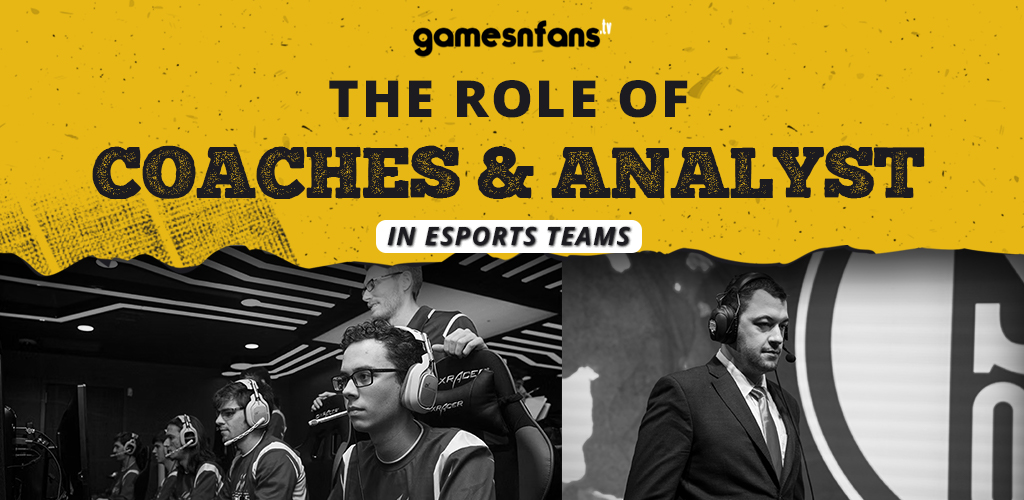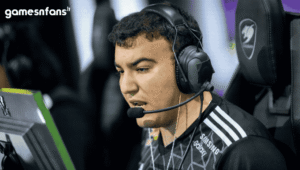The Role of Coaches and Analytics in Esports

In esports, coaching is the process of giving advice, support, and tactical direction to teams and players, whether they are professional or amateur. Like traditional sports, esports coaches are essential to helping players and teams succeed in competitive gaming by guiding them toward their full potential.
Esports coaches frequently possess a thorough knowledge of the game being played, including all of its mechanics, tactics, and meta-game trends. To pinpoint areas for development, they carefully collaborate with gamers, discuss strategies, and analyze gameplay footage. Additionally, coaches can help with team coordination, communication, and creating winning game strategies.
Duties of Esports Coach
- Development of Strategy: To counter particular opponents or accomplish particular goals, coaches analyze the playstyles of their opponents and come up with strategies and game plans.
- Gaming analysis: Coaches watch gaming videos to find the team’s and individual players’ strong points, shortcomings, and opportunities for development. They might offer suggestions and criticism to help you make improvements.
- Training and skill development: Coaches devise practice schedules and drills to aid players in honing their aim, decision-making, communication, and teamwork skills. They might also offer advice on complex strategies and game mechanics.
- Squad dynamics: Coaches promote cohesiveness among the squad and help players communicate effectively. They support the formation of team roles, the resolution of disputes, and the development of an effective team environment.
- Preparation for the Tournaments: Coaches help with tournament preparation by researching game updates and patch notes, analyzing opponents’ methods, and creating specialized strategies or counterstrategies for upcoming matchups.
- Supportive concerns: In order to help athletes deal with the strains of competition and keep a positive outlook, coaches offer emotional support, inspiration, and mental resilience training.
A mix of game expertise, leadership qualities, communication skills, and a thorough grasp of each player’s unique strengths and shortcomings are frequently found in successful esports coaches. In the fast-paced and intensely competitive environment of esports, they are essential for maximizing team performance and assisting players in achieving their objectives.
Read More: Building An Optimum Team In Esports
The importance of coaches in Esports plays a vital role:
The performance of professional esports teams is greatly influenced by the coaches and analysts in the industry. They collaborate closely with players to create plans, spot flaws, and boost performance.
Esports Coaches’ and Analysts’ Fundamental responsibilities are:
- Create strategies: Coaches and analysts collaborate with players to create successful plans. This entails determining the team’s advantages and disadvantages as well as those of their rivals.
- Identifying the team’s shortcomings: It is done by the coaches and analysts. This can be achieved by chatting to players, studying data, and watching game replays.
- Performance enhancement: Coaches and analysts work with players to help them perform better. This can be accomplished through giving comments, making recommendations, and developing training plans.
- Support and encourage players: Coaches and analysts encourage and encourage players. Esports can be an extremely demanding and stressful hobby; this is crucial.
- Keep up with the most recent trends: Coaches and analysts must keep up with the most recent esports trends. This covers fresh approaches, fresh gameplay elements, and fresh player tactics.
The Importance of Esports Analytics
Esports data analytics in competitive gaming is crucial because it offers a variety of information on all facets of the game, from player performance data to understanding team dynamics and communication. Teams can pinpoint strengths and weaknesses, enhance strategy, and maximize player performance using this data-driven approach. Utilizing analytics is crucial for success in a sector where minute differences might decide the result of a match.
Analytical Uses in Esports
Esport analytics has several uses and may be applied to different facets of team performance and strategy. The following are some of the most popular applications:
- Analysis of player performance: Teams can pinpoint areas for improvement and put in place focused training programs by analyzing individual player statistics. To analyze player performance and make data-informed judgments about roster changes or adjustments, factors like kill-death ratios, accuracy, objective control, and many other particular in-game metrics can be examined. Additionally, tracking player performance over time enables coaches and analysts to spot trends and measure advancement, ensuring that each player keeps getting better.
- Enemy surveillance: Esports statistics are essential for scouting and getting ready for competing teams. Teams can predict an opponent’s actions, exploit weaknesses, and create counterstrategies by studying their strategies, tactics, and playstyles. In high-stakes games and tournaments, having access to information on the past performances and habits of the opposition can provide teams a distinct advantage because it enables them to adjust their game strategies.
- Analysis and Strategy Development of Video Games: Decision-making and in-game strategy might be influenced by information gathered from previous games. Teams can develop a greater grasp of the most efficient strategies for various game conditions by recognizing patterns and trends in both their own gameplay and that of their opponents. The team’s chances of success can then be increased by using this knowledge to develop comprehensive strategies that take a variety of potential outcomes into account.
Read More: Evolution of Esports Titles: From Arcade Games to Global Phenomena
- Dynamics of the team and communication: Esports analytics can also shed light on team dynamics, pointing out potential communication problems or areas where coordination should be strengthened. Teams can increase synergy and improve overall performance by addressing these problems. Additionally, analytics may be used to find patterns in team communication, giving coaches the tools they need to put methods in place that improve decision-making during games and expedite communication.
- Schedules and Training Programmes: Esports analytics are also used in the creation of players’ individualized training schedules and regimens. Teams can create the most effective training regimens that maximize performance and reduce the danger of burnout by analyzing the performance data of individual players and taking into account elements like exhaustion, mental health, and physical health. This specialized method of training can ensure that athletes constantly deliver their finest work, which is crucial in the fiercely competitive esports industry.
How does Data Analytics make Gaming Better?
All game creators want to make games that people love, regardless of the genre of game they specialize in or the platform they use. After all, more players play better games, which increases revenue. The number of daily active users (DAU), monthly active users (MAU), and average revenue per user (ARPU) are just a few metrics that might show how well a game is performing. Developers can use analytics to identify areas for improvement in these KPIs, guiding their workflows and instructing them on what to prioritize going forward. Developers can apply strategies to minimize churn or increase playtime by utilizing analytics to find patterns in their user base.
What are the Coaching Strategies for becoming an Esports Coach?

A mix of abilities, knowledge, and experience is necessary to become an esports coach. The following actions can help you on your path to becoming an esports coach with the strategies presented below:
- Gain a thorough understanding of the game: Play the game you want to coach before anything else. Learn everything about the game’s mechanics, tactics, and meta-game trends. Spend time watching gaming videos, studying professional matches, and keeping up with the most recent game updates.
- Increase coaching expertise and knowledge: Learn coaching techniques and information in a variety of ways. Study coaching methods and strategies in books, articles, and manuals. Attend esports coaching-specific workshops, conferences, or online courses. Look for educational initiatives or credentials that offer formal coaching or sports science instruction.
- Experience matters a lot more: Find opportunities to earn coaching experience by searching for them. This can involve setting up neighborhood competitions or serving as a volunteer coach for amateur teams. Give your teaching expertise to friends or other players who want to get better. Creating a portfolio of coaching experiences shows your dedication and knowledge.
- Network within the esports scene: Participate in the esports scene by attending conferences, events, and competitions. Make connections with athletes, coaches, and other business leaders. Developing a strong network can open up important doors for mentoring, career prospects, and collaboration.
- Online presence counts: Start producing information connected to the game you want to coach and develop your internet presence. This can be offering coaching advice and tactics on social media platforms or YouTube, analyzing games, or streaming your gaming. Making an internet presence can aid in showcasing your expertise, abilities, and coaching approach and draw interest from prospective players or teams.
- Seek mentorship and advice: Look for seasoned coaches or business experts who can serve as mentors and advisors. They can help you learn and improve as a coach more quickly and provide insightful recommendations.
- Apply for respective positions: Watch for coaching job openings in the esports sector and submit an application. To work with their players, several professional teams, esports leagues, and academies employ coaches. Create a CV that highlights your coaching expertise, accomplishments, and experience. Adapt your application to each unique opportunity and show how your abilities fit with the team’s objectives and core values.
Keep in mind that it might be difficult to enter into the esports coaching field; therefore, persistence, ongoing education, and networking are essential. If you are passionate, committed, and have a good work ethic, you can boost your chances of success in pursuing your desire to be an esports coach, even though it may take some time to establish yourself as a coach.
When can I Anticipate being paid to Coach in ESports?
The length of time it takes to become a professional esports coach can vary widely based on a number of variables, such as your ability, experience, networking skills, and the opportunities present in the sector. It’s crucial to embark on your path with reasonable expectations and recognize that it can take some time before you are able to charge for your coaching services.
The following factors can have an impact on Esports management and here are a few that include the responsibilities of analysts:
Read More: Top Esports Players in India
- Development of Skills and Knowledge: It takes time to establish a solid base of game knowledge, coaching abilities, and strategic comprehension. You must put up a lot of work to hone your skills and stay up to date on the rules of the game and coaching methods. Depending on your starting place and the level of knowledge you want to obtain, this could take months or even years.
- Earning dignity, with the working functionalities: Gaining coaching experience especially with successful teams or athletes can greatly increase your chances of landing a job as a professional esports coach. You’re more likely to acquire paid coaching chances the more experience you gain and the better reputation you establish within the esports community. This procedure can take some time and differs for every individual.
- Networking and Connectivity: Developing a network of connections inside the esports sector is essential for locating paid coaching employment. Participating in competitions, attending events, and networking with players, teams, and other business leaders can open doors and result in paid coaching opportunities. Developing the relationships necessary to land paid positions through networking can be a slow process that takes time.
- Opportunities and Market Demand: The availability of paid coaching employment may be influenced by esports industry expansion and market demand. There may be more prospects for paid coaching employment in games with established professional scenes that are extremely competitive. To determine the availability of coaches, it’s critical to be updated about the situation of the market and the particular sport you’re interested in coaching.
- Development of personal growth: As your coaching career advances, it’s critical to keep improving your abilities, gaining new knowledge, and adjusting to market trends. Your worth as a coach may increase, and prospective employers may find you more appealing if you continue to grow personally.
Given the vast range, it’s challenging to give a specific date for when you may anticipate getting paid as an esports coach. Certain individuals might get hired as paid coaches rather quickly, while others might require time to get there. In order to finally land paid coaching jobs, it is important to be persistent, patient, and dedicated to continual progress.
In the interim, think about developing your skills and reputation by providing coaching services to amateur teams, producing material, and taking part in neighborhood activities. By taking these actions, you can build your reputation as an experienced and qualified coach, improving your chances of receiving payment for your coaching services in the future.
What are the Coaching Streams in the Gaming Industry?
In the field of esports, there are many different kinds of coaches to meet the varying needs of players and teams. Here are a few typical coach types you could see in esports:

- Head Coach: The head coach is in charge of the coaching staff and oversees the overall coaching approach. They are in charge of establishing team objectives, formulating plans, organizing practice schedules, and guaranteeing effective teamwork. The team’s dynamics and the game as a whole are frequently understood by the head coach.
- Strategic Coach: Strategic coaches concentrate on examining the playstyles of rival teams, creating game plans, and formulating unique strategies for competitions. They collaborate closely with the players and offer advice on making large-scale decisions, formulating strategies, and customizing gaming in accordance with the metagame of the time.
- Positioning coach: Coaches who specialize in coaching particular roles or positions within a team are known as position coaches. For instance, coaches may specialize in supporting, jungling, or tanking roles in team-based games like League of Legends or Overwatch. Individual player skill development, role-specific gameplay optimization, and positional cohesion are the primary concerns of position coaches.
- Analyst Coach: Analyst coaches spend the majority of their time gathering and analyzing data in order to acquire insights into team performance, game trends, and opponents’ strategies. They use this data to discover areas for development, make strategic decisions, and offer players and coaches insightful feedback.
- Psychological Coach: Sports psychologists or performance coaches, usually referred to as mental coaches, are concerned with the players’ mental and emotional health. They support athletes in building resilience, handling stress, coping under pressure, and maintaining a positive outlook. Along with improving communication, teamwork, and conflict resolution, mental coaches can help.
- Skills Coach: Players’ mechanical skills, such as aiming, moving, and reaction time, are refined by skills coaches. They closely collaborate with each player to pinpoint their areas of weakness, create practice routines, and offer advice on how to enhance particular gameplay aspects.
- Academy Coach: In esports organizations, academy coaches are in charge of development teams or junior rosters. Young talent development, skill enhancement, and preparing them for prospective promotions to the main roster are their key priorities. Academy coaches frequently possess both coaching and teaching skills.
- Support Staff Coach: Esports teams may also include support staff coaches who are experts in subjects like diet, exercise, or sleep hygiene, in addition to these specialist coaching positions. These coaches assist players in upholding their general health and well-being, which can support peak performance.
It’s important to keep in mind that different esports titles and organizations may have distinct organizational structures and coaching roles. Depending on their unique demands and resources, some teams may have a combination of these coaching jobs, while others may have more specialized responsibilities.
The lines between these coaching duties are not always clearly defined, and coaches frequently wear numerous hats and do a variety of tasks depending on the needs of the team. Regardless of their individual job, good esports coaches must possess a variety of skills, including flexibility, adaptability, and a thorough knowledge of the game.
CONCLUSION
Professional gaming teams’ success is greatly influenced by esports statistics, which informs tactical choices and motivates performance enhancements. Teams can use data to find development opportunities, create winning tactics, improve player performance, and improve team dynamics. We can anticipate further analytical developments as the esports sector develops, which will ultimately raise the level of competition and progress the sector. Teams and players who want to succeed in the fiercely competitive world of esports must embrace the power of statistics. The above information is very helpful in the management of eSporting games.
Read Also: The Ultimate Poker Chip Sets for Home Games
Read Also: VIRAT KOHLI- The Run Machine







